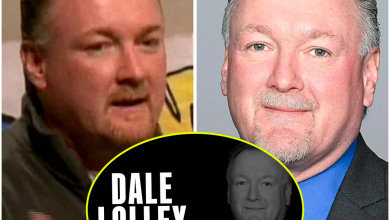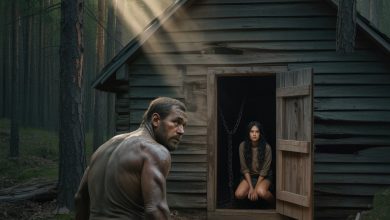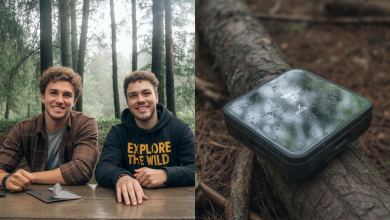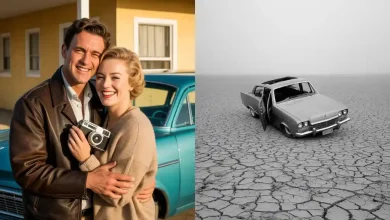My Parents Faked My Death to Cover Up My Sister's Crime. They Never Expected Me to Show Up at My Own Funeral.
The video arrived without warning on a Tuesday morning. It was from Mrs. Langford, our old neighbor, and the message just said, I’m so sorry about your parents. I can’t believe what I saw today. My stomach tightened.
I tapped the screen and a familiar church came into view—St. Albans, the place my parents took me on Christmas Eve as a child. The camera zoomed in on my mother and father at the podium. Behind them was a casket, and next to it, a large, framed photograph of me. My father’s voice trembled as he read from a piece of paper. “She was always a troubled girl,” he said to the silent crowd. “But we loved her. Though she left this world far too young, we pray her soul finally finds peace.”
I wasn’t dead. I was standing in my apartment, three thousand miles away, alive and breathing and watching my own funeral. This wasn’t a mistake. It was a performance. And in that moment, as I watched my mother dab at her fake tears, I knew I had to go home and find out why my family had decided to bury me alive.
The illusion of my family had shattered three years earlier. My younger sister, Elena, the golden child, the one who could do no wrong, had been caught embezzling nearly $80,000 from our family’s business. She had a taste for a lifestyle she couldn’t afford, and when the auditors came knocking, my parents were faced with a choice: expose their perfect daughter as a thief, or find a scapegoat. They chose me.
“Better one ruined daughter than two,” my mother had hissed at me in the kitchen. My father didn’t even look at me. “You humiliated us,” he said. “You’re no longer our daughter.” The next morning, I was gone.
They cut me off completely—no money, no contact, nothing. Friends and extended family who I tried to reach suddenly went silent. My number was blocked. My letters went unanswered. I had been erased. So, I did what broken people do. I left the country, found a quiet job in a cafe, and learned to live as a ghost.
The first clue that something was more sinister than a simple estrangement came a year ago when I tried to renew an old email account. A message from tech support informed me that the account had been deactivated due to a report of the user being “deceased.” It was a chilling, digital confirmation of what I already felt. I didn’t just leave; in their world, I had died.
The funeral video was the final, horrifying piece of the puzzle. I started digging. I called my Aunt Rachel, who hung up on me the second she heard my voice. I texted my cousins, who replied with, Is this some kind of sick joke? No one believed I was me. Finally, my youngest cousin, Sam, texted back, hesitantly. He told me the story my parents had spun: I had died in a tragic car crash overseas three years ago. They had a whole narrative, complete with a cremation and a closed casket because it was “too late to bring me home.”
With my heart pounding, I searched the public records office online. And there it was, in cold, official text: Maya Delacroix. Date of death: July 16th. Cause: Road accident. They had forged a death certificate. They had made me legally dead. But why?
The answer was waiting for me on Elena’s recently public Instagram page. Amidst a glittering carousel of photos from her lavish wedding was the final, damning piece of evidence. I found a post from six months after my supposed “death,” celebrating the transfer of my grandparents’ trust fund into her name. They hadn't just disowned me to protect Elena’s reputation. They had killed me on paper so she could steal my inheritance.
I hired a lawyer that morning, presenting him with a mountain of proof: my passport stamps, my employment records, my lease agreements. Unshakeable proof that I was alive. He was stunned. “You’re… challenging your own death?” he asked. “I’m not dead,” I replied, a fire in my chest. “But I plan to haunt them.”
Then, the anonymous tip came through: a public memorial service was being held for me at St. Albans the following Sunday. It was the stage I needed. This wasn’t just about getting my name back. It was about taking back my life, in front of everyone they had lied to.
I watched my own memorial from across the street, a ghost in a black coat and sunglasses. I listened as my father delivered a solemn, practiced eulogy about his “troubled” daughter. I watched as my mother sobbed delicately into a lace-trimmed tissue. And I saw Elena, clutching her pearls, speak of the sister she wished she could have said goodbye to.
The priest raised his hand. “Let us now stand for a moment of silence.” As the congregation rose, their heads bowed, I pushed open the heavy oak doors. The sound echoed through the church like a tomb cracking open. I stepped into the light, my heels clicking on the marble floor with deliberate, rhythmic taps. Gasps rippled through the pews. A child pointed. My mother’s face went white before she crumpled in a theatrical faint. My father’s wine glass shattered on the floor. Elena just froze, her face a mask of pure terror.
I walked all the way to the front of the aisle, stood beneath my own funeral portrait, and smiled. “I heard I died,” I said into the breathless silence. “But I’m here to correct the story.”
I pulled the folder from my coat and held it up. “There was no accident,” I said, my voice clear and steady. “I have been alive. I have been working. I have been surviving.” I turned and looked directly at my parents, then at my sister. “They told you I died so they could hide a crime. They faked my death so they could steal my inheritance.”
A murmur rose like thunder. A phone camera lifted, its red light blinking. Good. Let the world see this. “You didn’t lose a daughter,” I said, locking eyes with my father. “You threw her away. You buried me to protect yourselves.” I took one last look at their shattered faces. “But I came back to haunt you with the truth.” As I walked out, the church bells began to ring. It was a fitting sound. A funeral bell, but this time, it wasn't for me. It was for their lies.




